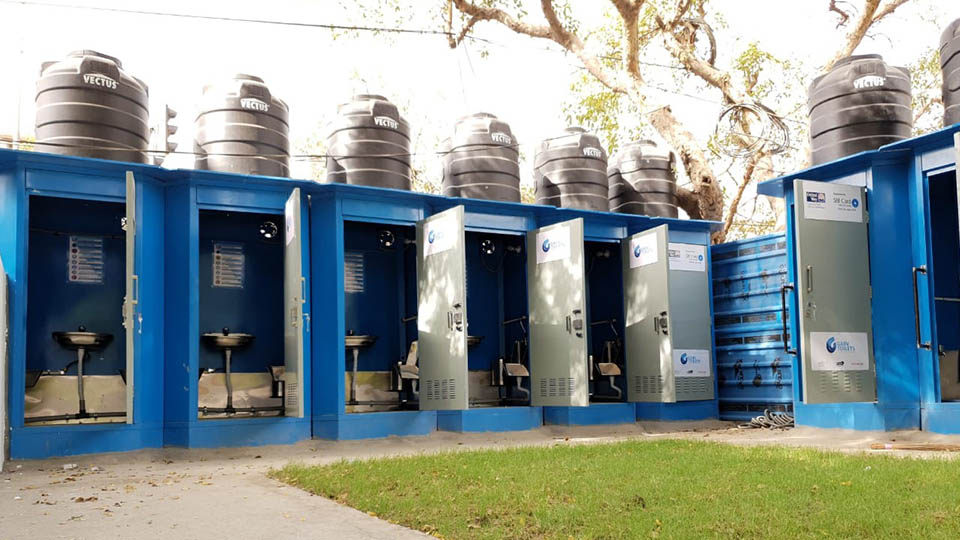Seven-year-old Hanifa Zaara claimed that her father had “cheated” her after
promising, and failing, to build the family a toilet if she topped her class at
school.
“I have been topping my class since nursery,” she wrote. “I am in the second
grade now. And he is still only saying he will do it. This is a form of cheating, so please arrest him.”
Her father told the BBC
that he had actually begun constructing a toilet, but did not have enough money
to complete it.
Hanifa’s story is a familiar one for millions of people living in the developing world, forced to defecate out in the open — a situation that makes young women in particular feel ashamed. In fact, women and adolescent girls bear the brunt of the effects of the non-existent toilet infrastructure, by risking their dignity and having to adjust their bio-schedules all year round.
But lack of access to clean and functioning toilets is a problem faced by more than 2 billion people worldwide. In India alone, 550 million people defecate out in
the open, increasing the chances of diarrheal diseases, particularly among
children. Where toilets do exist, a lack of good maintenance, vandalism,
improper waste disposal and a fear of being attacked deter many people from
using them.
It is a situation the Indian Government is acutely aware of; its Clean India
Campaign, launched back in 2014, provided a much-needed impetus. It was the
certainly the starting point for Miyank Midha and his wife, Megha, to
develop a business to tackle the issue head on.
“There is a real shortage of toilet infrastructure — and this crumbling
infrastructure is bearing the load of ever-increasing migrant population from
rural areas to urban areas,” Miyank told Sustainable Brands in a recent
interview. “The government has relied on conventional brick-and-mortar structure
toilet infrastructure for the past many decades, which has resulted in repeated
failed implementations with billions of dollars going down the drain.”
The solution as Miyank saw it: a self-sustainable toilet design and business
model, which can be scaled rapidly, while addressing the issues related to
toilet maintenance — high operational costs and efficient, decentralized waste
treatment.
So, that is what the Midhas’ business does: GARV
Toilets builds indestructible, stainless steel
toilets that are powered by solar panels and feature bio-digester tanks so that
they can be located anywhere in the world — even in places that lack the
infrastructure to deal with wastewater.
Rather ingeniously, the toilets can be maintained by way of automation. By
tracking their usage in real time, knowing when to clean them or fix broken taps
becomes much easier. Powered by an Internet of Things dashboard, the
business can offer hygiene-related data, too, such as how many people washed
their
hands
after using the toilets — information that can be made available to local
governments to inform health education campaigns, for example.
 The toilet hubs are either set up in government-aided schools through CSR
partnerships; or in urban slum areas, through public-private partnerships with
government bodies. A community service kiosk can also be established outside the
toilet block, offering multiple services to communities including medical
services, micro-health insurance and the roll-out of government schemes.
The toilet hubs are either set up in government-aided schools through CSR
partnerships; or in urban slum areas, through public-private partnerships with
government bodies. A community service kiosk can also be established outside the
toilet block, offering multiple services to communities including medical
services, micro-health insurance and the roll-out of government schemes.
Operating since 2016, GARV Toilets – one of the winners of the 2018 Unilever
Young Entrepreneurs
Awards – has installed 348 toilet blocks across India, Bhutan, Ghana and
Nigeria. In the next two years, this number is set to rise to 900. And with
some 5 million households living in urban slum areas without good access to
toilets in India, along with 300,000 government-aided schools needing toilet
infrastructure, there is still more to be done. There is also a great
opportunity in Ghana, where 75 percent of people rely on public toilet
infrastructure, which is now mostly defunct.
“Our solution is not bound by boundaries,” Miyank says. “It is a pre-fabricated
modular design which can be easily assembled on site in a few hours.
“Nobody has ever tried to maintain toilets in this way, using smart technology
which can also be integrated into traditional and existing toilets, too.”
Get the latest insights, trends, and innovations to help position yourself at the forefront of sustainable business leadership—delivered straight to your inbox.
Tom is founder of storytelling strategy firm Narrative Matters — which helps organizations develop content that truly engages audiences around issues of global social, environmental and economic importance. He also provides strategic editorial insight and support to help organisations – from large corporates, to NGOs – build content strategies that focus on editorial that is accessible, shareable, intelligent and conversation-driving.
Published Jan 9, 2019 7pm EST / 4pm PST / 12am GMT / 1am CET